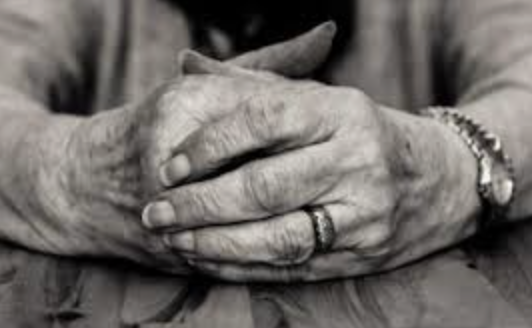THE GOLDEN YEARS
While celebrating my dear husband’s 70th birthday in Europe, we often exchanged smiles and greetings with the many other white-haired people we encountered in Paris, Barcelona, and Amsterdam. Later I would conjure up in my imagination stories of their lives shaped by history, resilience, and faith.
I imagined Madame Madeleine Cohen, 87, living in the Marais, a district with deep Jewish roots. Each morning, she walks to her favorite café by the Seine, where she has her daily café au lait and a small bowl of fruit and reflects on her past as an artist. Though her hands are unsteady, her memories of wartime Paris and the resilience of her people remain sharp. In my story, her dear friend Pierre, 90, a retired actor and fellow survivor of the war, often joins her for a glass of wine, and together they recall the days of resistance and liberation. He speaks of the past, the resistance movements, the secret hiding places, the bitter taste of exile. Madeleine listens with empathy, though she knows it’s not only the trauma they share, but also the joy and resilience of their people. As they sit by the Seine, they reminisce about the past, the days when they danced at the fêtes de la Libération, when the streets of Paris were filled with hope.
I created the story of Clara and Miguel Benaroya, both 89, who lived in Barcelona since they were children, though their families’ roots go back to the Jewish communities of North Africa. Their life together is a testament to the city’s unique blend of cultures, where Moorish, Catalan, and Jewish traditions intertwine. Their modest apartment in the Gothic Quarter is filled with family photos, old Hebrew books, and the lingering aroma of Clara’s homemade challah. Every Friday afternoon, they light the Shabbat candles together, just as they have for nearly 70 years. Clara remembers the Barcelona of her childhood, when the Jewish community was smaller and less visible, when her parents would whisper the Shema before bed. The Jewish community, though still small, is thriving with new synagogues and Jewish cultural centers.
In my imagination, Miguel smiles, his eyes softening with memories. He was an architect in his younger days, working on projects that helped shape the city’s skyline. Now, in his retirement, he is writing a memoir, capturing his experiences as a Sephardic Jew living through times of change. His book is not just about his life, it is about the stories of his ancestors, about how they survived and thrived in a city that sometimes embraced them, and sometimes shut them out. Their children, now scattered across the world, join them on Zoom, and for a moment, they are all together again, connected by tradition, by faith, and by love. They add a special Mishaberach blessing for the families of those who lost their lives and lost their homes in the Valencia floods in October.
Jan and Els Levi, in their 90s, have lived in Amsterdam their whole lives. They find peace in the city’s Jewish neighborhood. Though their children live abroad, they continue to honor their traditions, finding solace in their faith and in the community of survivors and descendants who share their history. Their apartment, overlooking the tranquil canals, is a quiet haven, a place of refuge after decades of tumult. Jan’s parents were born in the Netherlands, but Els’ family came from Germany, escaping the horrors of Nazi persecution. Amsterdam was where they met after the war, where they rebuilt their lives.
In the evenings, they sit by the window and talk of the past – the friends and family they lost during the Holocaust, the stories their parents told them of life before the war, the difficult years of rebuilding after liberation. Amsterdam, like so many European cities, holds these memories in the quiet places —the museums, the memorials, the synagogues. But for Jan and Els, it is not just a history to be mourned, but one to be honored and remembered.
The city has changed dramatically since then, but Jan and Els remain anchored in their small community, the Jewish neighborhood in the heart of the city. They regularly attend services at the Portuguese Synagogue, a magnificent 17th-century building that has for centuries been a spiritual center for the Jewish community. The sounds of the shofar, the prayers in Hebrew, and the familiar faces of old friends are part of the fabric of their lives.
Jan and Els often join a group of old friends at the local “brown café,” a traditional Dutch pub where people gather to talk, laugh, and share stories. Many of their friends are descendants of Jewish refugees, survivors, or children of survivors. There’s a comfort in being with people who understand the weight of the past, who share a common history that is both painful and beautiful.
When they sit down for their weekly Shabbat dinner, Jan recites the Kiddush over the wine, and Els lights the candles, just as her mother did. Their children live abroad, but they always come back for the holidays, and the house is filled with laughter and the aroma of brisket and kugel. The traditions remain, even as the world around them changes. They feel the weight of worry after last night’s pogrom in Amsterdam where Israeli soccer fans were attacked and seriously injured after the game and all this hate timed during the annual commemoration of Kristallnacht. When will the hatred end?
In my mind for these older Jewish couples, retirement is not merely about slowing down and recalling the past. It’s about preserving the legacies of those who came before them and passing those values on to future generations. Despite the changing world, they remain grounded in their faith, family, and history. Their golden years are a testament to the strength of Jewish communities in Europe, rooted in the memories, history and resilience, and everyday rituals that sustain them.
While these people populating my imagination are fictional, they symbolize for me the beautiful places we visited, and the joys and comforts that come with aging.
May The One who brings peace to the universe, bring peace to us and to all the people Israel.
Shabbat Shalom.






You write like a sensitive poet; sensitively and keenly observing and imagining complicated life stories. As I read this I traveled to Europe in my mind and got to know more about my elders. Thank you, Jo.